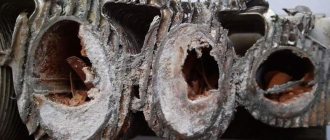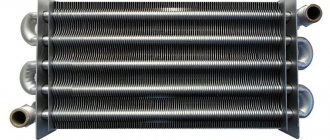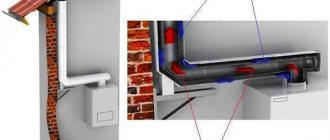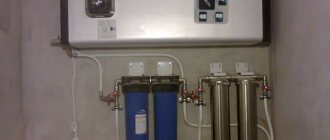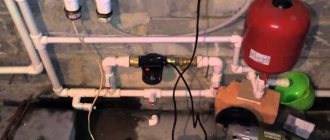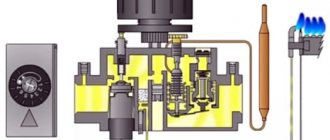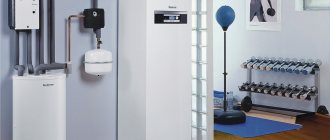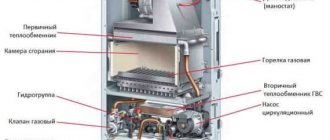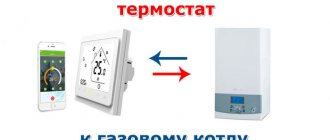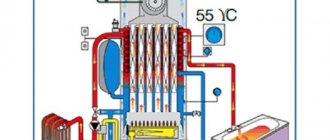How to understand that the water in the heating system does not meet standards
Water from reservoirs, wells and city water pipelines is guaranteed to have high hardness so that it can be used directly in the boiler, only with different indicators. Any of them is dangerous for the boiler and water heating equipment.
You can verify this yourself by performing express tests using test strips to determine water hardness. They can be purchased at hardware stores or pet stores.
Paper indicators are treated with reagents; when they get into water, they acquire a certain color, which is compared with a standard scale.
Water hardness is determined in degrees (°F). According to GOST No. 31865 of 2012, the following hardness indicators are established by which natural water is classified:
- not higher than 2°F - soft;
- not higher than 10°F - average;
- above 10°F - extremely hard.
For use in boilers, water with a hardness of 2-5°F is already dangerous because it promotes scale formation, so it will need to be purified with water softening.
How to clean a gas boiler: procedure for each unit and do-it-yourself cleaning video
An indispensable attribute of any heating system is a boiler, which acts as a heat generator for heating the home.
The modern heating equipment market is saturated with a very wide range of boiler units of various types. But gas boilers occupy a special place in this range. which are gaining more and more popularity every day.
This trend is due to the fact that units of this type are very effective and economical devices for heating a country house or even an apartment. In order for a gas boiler to function smoothly and stably, it is necessary to properly care for it.
One type of such maintenance is cleaning the gas boiler from soot and other contaminants. Let's talk in more detail about why to clean a gas unit, as well as in what ways this can be done.
Types of water softening filters
The domestic market is overflowing with offers for water purification filters, both domestic and Western-made. The user needs to understand which softener is best suited for the boiler and autonomous heating system. Next, you will need to select the most appropriate purification method for the initial composition of the water.
Polyphosphate filter
The most affordable and cheapest water softening filter for a boiler, and at the same time a very effective cleaning option. The ion exchange polyphosphate filter module consists of the following basic elements:
- Plastic container in the form of a flask, transparent;
- protective cover for cartridge replacement;
- drainage;
- softening chemical reagent—polyphosphate salt.
Raw or tap water enters the filter container, circulates through a chemical reagent in the form of polyphosphate salt crystals and is impregnated with sodium polyphosphates, forming a phosphate film. It envelops hardness salts, thereby neutralizing their scale-forming properties and protecting boiler heating surfaces from salt deposition.
Polyphosphate is a toxic substance, so after contact with it, water becomes undrinkable. These softeners must be used carefully in hot water supply systems, since due to possible leaks in the structure, water may enter the hot water supply or hot water supply line.
The service life of polyphosphate filters, or rather dissolving polyphosphate salt, is short. The standard consumption of the reagent is 5 grams per 1 ton of water. The reagent is replaced when its volume in the flask is halved. This happens after about six months of filter operation. The cost of polyphosphate ion exchange filters ranges from 500-1400 rubles, and replacing polyphosphates will cost the owner up to 350 rubles.
Magnetic filter
This is the most expensive and effective cleaning method. If you install a compact permanent magnetic filter in front of the boiler, you will not need to constantly regenerate it or change the filter material. It cannot soften water, that is, remove hardness salts from it.
The principle of its operation is different and is based on the transformative effect of a magnetic field on water, as a result of which its structure changes briefly.
Passing through the magnetic filter element, boiler water changes its own physical qualities, while the crystallization process when heating the liquid occurs more intensely, but not on the surface of the heated boiler walls, but in the water column. In connection with this, sludge is formed, which is easily removed by blowing or in a mud pan in front of the boiler.
A characteristic feature of this method of softening boiler water is the temporary nature of magnetization of water, therefore such a filter is installed as close as possible to the boiler unit.
The advantage of this treatment is that when water passes through a magnetic filter, it does not become technical and harmful to humans, therefore it is applicable in double-circuit boilers with hot water heating.
The service life of such softeners is practically unlimited, since the device has no moving or rubbing parts. The cost of installation ranges from 1,500 to 25,000 rubles, depending on the brand, design and hourly productivity of purified water.
Electromagnetic
At a high temperature of hot water in the boiler circuit and a high circulation speed, complete separation of hardness salts from water only with the help of magnetic treatment often does not occur, especially for natural waters with high hardness. To enhance the magnetic effect, electrical treatment of the water is added by placing a specialized electrical treatment on the magnet.
Such a device also functions by treating the source with a magnetic force field, the strength of which is regulated by an effective electrical processor. This pair makes it possible to get a longer lasting effect.
The operation of such a device does not depend on pressure changes and temperature conditions. Transforming hardness salts not only do not harm the boiler, but also act as softening agents for previously deposited scale. Installation cost: from 5,000 to 30,000 rubles.
Heat exchanger flushing methods
The heat exchanger for a gas boiler is one of the main parts of the unit. The quality and temperature of the coolant and the efficiency of the device depend on it. When using hard water, salt and limescale deposits occur on the walls of the element. From here, equipment overheats, fuel consumption increases, and the load on the circulation pump increases.
There are three ways to wash the heat exchanger yourself.
To gain free access to all parts, you need to dismantle the element, then carefully remove the scale with a scraper, vacuum cleaner or wire brush
Here it is important to be attentive and careful not to damage the parts and sealing materials of the boiler system, which will lead to depressurization and breakdown of the unit
Do-it-yourself cleaning of the heat exchanger of a double-circuit boiler is carried out by soaking the parts in solutions that soften deposits (for example, a 30% citric acid solution). Then all mechanical impurities are removed from the channels using improvised means.
The best filters for the boiler
Before making a choice, you need to refer to the factory instructions and familiarize yourself with what the manufacturer offers as water treatment for the boiler. Then, in any SES laboratory or even from a water supply company, you need to take complete results of an analysis of the water that will be used to feed the boiler and heating networks. Before you begin selecting possible modifications, choose from a line of boiler or water heater filters.
In addition, when choosing, experts also advise paying attention to the following parameters:
- Productivity - determines the hourly volume of purified water, m3/hour.
- Dimensions and installation area so that the purifier can be integrated into the existing free space in the boiler room.
- Thread diameter - it must correspond to the diameter of the heating systems.
- Brand - it is safer to purchase a filter from a popular manufacturer and in branded stores. Unfortunately, there are many counterfeits in the retail chain, and in addition, in branded stores you can issue a reliable guarantee and consult on the procedure for using the filter.
Magnetic filter Aquamax XCAL MEGAMAX
Aquamax XCAL MEGAMAX 1/2″ is an Italian highly efficient magnetic anti-scale filter for boilers and boilers. It cleans the heating surfaces of boilers from limestone formations. Designed for heat supply systems with high circulation rates.
The MEGAMAX magnetic softener is made of first-class non-corrosive steel and is considered not dangerous to people. The device does not require changing filter materials. Suitable for boilers with 1/2" piping and can purify water 0.8 m3/hour. Price: 1860 rub.
Phosphate filter Ecosoft SCALEX 200
The filter for the heating boiler Ecosoft SCALEX 200 prevents the formation of scale in heating systems and contains an ecological filter media that does not have polyphosphate, which allows its use not only in heating boilers, but also in hot water supply systems.
The SCALEX 200 filter has the function of chemical water purification and performs mechanical purification of suspended solids and rust products up to 100 microns in size.
Ecosoft SCALEX 200 does not remove hardness salts from make-up water, but has a comprehensive effect on them thanks to the simultaneous use of 3 protection mechanisms:
- Stopping the growth of hardness salt crystals.
- Destruction of the beginnings of foci of scale crystallization.
- Prevents the connection of scale-forming crystals with each other.
The filter can operate without replacing the filter material for 6 months. Cost 1260 rub.
Anion filter SVOD-AS sbb10
A powerful softener can be used not only in domestic heat and power engineering, but also in industrial boiler houses. The device purifies water from hardness salts, heavy metals and any suspended pollutants and impurities.
Water is processed in a special anion exchange cartridge, the reagent of which is processed using a special technology with chemically active components. As a result, Ca and Mg ions in the water are replaced by Na ions, thereby creating easily soluble sodium salts that do not deposit on hot boiler surfaces.
The filter housing is made of plastic that can withstand medium pressure up to 6 atm. One cartridge can process 262 m3 of water and has a shelf life of three years. Price 6700 rub.
Magnetic filter Caleffi XS
The Italian filter is designed for boiler water treatment and combines two types of cleaning: mechanical and magnetic, using a neodymium magnet and a transparent sludge collection chamber to visually control the process. The device can operate in an environment at a pressure of 3 atm. and hot water temperature 90 C. Hourly productivity for make-up water is 3.5 m3/hour. Warranty - three years. Price: 5600 rub.
Recommendations for selection
Before buying a filter for a gas boiler, you should consult with a specialist who will recommend a suitable device and give recommendations.
General recommendations for selection:
- If you plan to use a gas boiler frequently, it is better to give preference to an electromagnetic device: it will not allow scale to accumulate on parts, and will also work for a long time without additional maintenance.
But it should be remembered that you will have to constantly change the filler and the service life of these filters is shorter compared to electromagnetic ones.
- When choosing a device, you need to immediately decide where to install it. Sometimes installation requires a large space, which is not always possible.
- Be sure to make sure you have a warranty card. Good manufacturers of such devices never sell their product without providing a guarantee for it.
- It is preferable to purchase devices from well-known brands, since such products are more difficult to counterfeit. Often, unscrupulous sellers sell counterfeits under the guise of a well-known brand at a very low cost, so you should also pay attention to differences in prices for filters from the same manufacturer.
- If the tap water is hard, then in order to better protect the gas boiler, it is recommended to buy two filters at once , focused on different degrees of water purification.
- To simultaneously soften the liquid and protect the internal parts of the boiler from possible damage, it is better to use devices that soften water and have the ability to create a protective film on the heating elements.
If you follow all the recommendations described above, you can choose a device that is suitable for the price and technical characteristics.
Connection to the heating system
In order to independently install a filter in the heating system, carefully study the manufacturer’s instructions and the wiring diagram. Typically, boiler filters have threaded connections: ½ or ¾ inches.
Filter connection location in the heating system
It is installed at the inlet in front of the heating boiler on the return line of the heating system. The distance to the boiler should not exceed 2 meters.
Pre-prepare the filter for installation. For example, a polyphosphate filter needs to be washed to remove small particles of filler, and a cation exchanger needs to be regenerated, that is, pass a saline solution through it.
Next, install the filter using a threaded connection, sealing it with fum tape. Before placement, pay attention to the direction of movement of the coolant, the permissible temperature and pressure of the water passed through. To be able to service the filter, it is cut off from the heating return line with two valves and a bypass line is made.
Features of installation in the house
The process of installing a water filter for a gas boiler depends on what kind of filter we are talking about. But there is a general procedure.
Materials and tools
Before installation, you need to prepare everything you need so that the work does not take much time:
- brush for preliminary cleaning of pipes leading to the boiler;
- tool for carving plastic pipes;
- fum tape;
- tow;
- pliers;
- device for soldering plastic pipes.
All of the listed tools must be present in the arsenal during installation. You should also have on hand instructions for installing a specific type of device in front of a gas boiler.
Selecting and preparing a site before installation
The equipment is installed directly in front of the pump , since installation anywhere else would be pointless. The pipes into which the filter will cut must be free of dirt and scale, so you should first clean them with a brush or a special brush.
Important! The place where the device is supposed to be installed must be accessible for further maintenance of the device.
Installation
Installation involves several steps:
Important! When installing an electromagnetic filter, the possibility of connecting to the electrical network .
It is recommended to check in advance whether the diameters of the pipes, filter and taps match each other. In addition, experts advise mounting the pipes and filter on special brackets , thanks to which the installations will be securely held.
Starting the DHW system and checking
After the filter is installed, the DHW system is checked. To do this, first turn on the water: if nothing is leaking anywhere, turn on the gas.
The operation of the electromagnetic device will be immediately clear, since it operates from the network.
But how effective a filter of another type is can only be understood over time.
To avoid mistakes, both when installing a filter on the boiler and when checking and starting the system, it is better to invite an experienced specialist.
Alternative Mitigation Methods
In fact, in well-executed individual heating systems, leaks in the system are very small, and water is practically not replenished throughout the entire heating season. In such a situation, an alternative way to install water purification systems may be to purchase and fill the circuit with already purified water.
To do this, the user can use the following options:
- purchase purified water of the required volume, purified in powerful water treatment plants, for example, in industrial boiler houses;
- purchase distilled water in a retail chain;
- pour boiled water prepared at home.
All boiler manufacturers must indicate in the technical documentation the permissible composition of water for the boiler and methods of its preparation. It is best to follow these recommendations, then the owner will not have problems with either the boiler or warranty service. It is prohibited to independently add any reagents to the water: vinegar, alkali or acids for pre-boiler water purification.
Working principle of salt purifier
To assess the feasibility of installing a salt filter, it is necessary to understand the effect it has on the water.
Harmful compounds do not have a distinct taste or appearance, so
it is impossible to determine the calcium and magnesium content by eye. This is done through laboratory tests and the use of litmus tests.
Attention! Magnesium and calcium salts become especially dangerous when heated. Increasing temperatures turn them into solid particles.
Household appliances exposed to hard water may react in the following ways:
- Due to the decrease in thermal conductivity, heating occurs more slowly, and the washing process in the dishwasher and washing machine becomes ineffective.
- Solid particles settle on the internal parts of equipment, which causes disruption of their operation. The first to suffer is the heating element, which becomes covered with scale and fails.
- When the pipeline is clogged with solid particles, the efficiency decreases.
To neutralize the harmful effects, polyphosphates are used. To treat 1 cubic meter of water, a substance concentration of 3.5-4.5 g is required. Polyphosphates react with salts, forming a microscopic film on their surface.
As a result, they cannot combine with each other and form tight connections. There is also no possibility of attaching them to the surface of water supply and heating pipes.
Important! After purification, the water does not become suitable for drinking and cooking, but it ensures uninterrupted and durable operation of household appliances.
Advantages and disadvantages
First, let's look at the main advantages:
Minimum costs with high efficiency. Salt filters for household use have a simple design, so they can be found from 170 rubles. The price for 700 grams of salt is approximately 500-600 rubles.- Easy to install. Small models for washing machines and dishwashers are mounted directly in front of the appliance, without requiring special skills.
- Reducing the volume of existing scale. The salt filter not only softens the water entering inside, but also helps get rid of the water that has already formed.
- Compactness of the system. With a small size, the filter performs its functions at the household level.
The disadvantages include:
- Harm to the human body. Water that has passed through a polyphosphate filter is not suitable for drinking. It can cause allergic reactions, redness of the mucous membrane and irritation of the skin.
- At elevated temperatures and excessive loads, insoluble phosphate deposits and iron phosphate compounds can form, provoking corrosion processes.
Reference! Water after the polyphosphate filter is used only for technical purposes.
How to choose?
In addition to their intended purpose, salt filters may differ in their design, manufacturer and quality of materials.
When choosing equipment, it is necessary to take into account a number of parameters:
Threaded connection material . It must be copper. Avoid threads made of silumin and non-alloy steel.- Equipment dimensions . The volume of the flask determines the amount of salt added, and therefore the productivity.
- Filling consumption for every 100 liters . The lower this number, the less often you will have to top up.
- Temperature operating conditions . Its maximum value should reach 50 degrees.
- Intake valve model . If there is an automatic control system, water softening occurs automatically. A person is needed only at the stage of filling sodium polyphosphate. For large volumes, this function is simply necessary. Moreover, the cost of the device starts from 1,700 rubles.
- Availability of certificates and warranty conditions.
Attention! At temperatures above 50 degrees, polyphosphates lose their properties! Avoid overheating the system.
